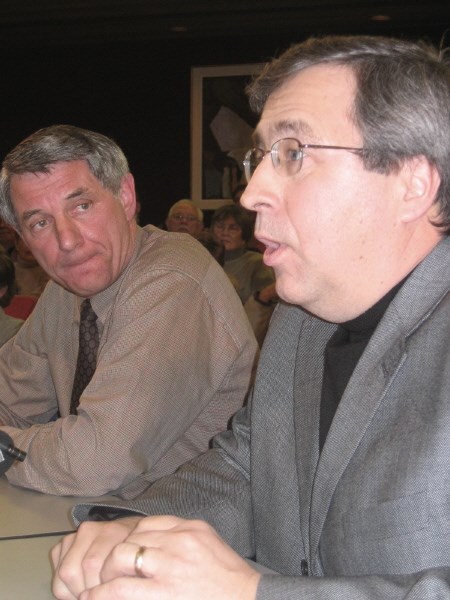Deputy mayor and budget chief Peter Chirico says he opposes a special tax area for people who don’t receive the same services as others elsewhere in North Bay.
Anita Avenue resident John Marshall, who attended Tuesday night’s public budget session, brought up the special tax area idea during his presentation to city council.
Marshall said taxpayers who live in “rural and under-serviced areas” of North Bay were facing assessment increases of between 15 and 35 per cent.
Similar cap
And in asking council for help, Marshall put forward two proposals.
The first, he said, was a maximum cap on tax increases, similar to the five per cent cap on multi-residential, industrial and commercial classes.
“We propose a similar cap be placed on residential increases, such as a cap in the order of, say, 1.5 times the average increase for the city,” Marshall said.
“Keep in mind that the greatest tax increases are being incurred by those with the least services.”
The same tax dollar
Marshall then proposed the special tax area to provide a “differential tax rate” for those receiving services and those who don’t.
Taxpayers in rural and/or under-serviced areas, Marshall said, currently receive reduced fire protection, “meaning no fire hydrants”; reduced police protection; little or no bus service; no storm sewers; no sidewalks; substandard roads and minimal street lighting.
The tax rate for under-serviced areas in neighbouring East Ferris, Marshall added, is approximately 1.2 per cent, “where as in North Bay for the same services we are paying 1.718 per cent.”
And if North Bay isn’t prepared to consider a special tax area or the cap, “then at least consider giving us the same services the rest of the city enjoys for the same tax dollar.”
Fair treatment
Under the present system, Marshall said, a house assessed at $200,000 in a serviced area is subject to the same taxes as an identically assessed house in an under-serviced area.
“We are not looking for special treatment,” Marshall said, “just fair treatment.”
Chirico said following the public meeting that he was against a tiered tax policy within the city because of the domino effect it could cause.
“I mean who's next? Which portion of the city which doesn’t have a specific service is next,” Chirico said.
“They may have wait times for police and fire, but unless you live right beside them on Princess Street, everybody has wait times.”
Unfair to overall population
Chirico doesn’t think a tiered tax system is fair “because it puts it on the core services.”
“All people use this city,” Chirico said.
“They live out in that area but they’re in our city day after day. They work, they live, they drive on our streets, they use all of our facilities, etc. So I find that going to a tiered tax system would be very unfair to the overall population.
Most of the people in the audience had come to hear Marshall speak. But Coun. Tom Mason drew a few groans and boos from them when he trotted out an old maxim.
“There are only two certainties in life, death and taxes, and we have no control over those,” Mason said.
“But we can control where we chose to live.”
Increases include tax and asessment hikes
Earlier in Marshall’s presentation, Mayor Vic Fedeli cleared up the issue of tax and assessment increases.
Marshall had said the people he represented were facing tax increases ranging from 25 to 50 per cent based on the assessment increases of 15 to 35 per cent “in addition to tax rate increases of 10 to 15 per cent.”
Fedeli, with confirmation from treasurer Brian Rogers, said the 15 to 35 per cent increases already included hikes in assessment and taxes, and that there wouldn’t be anything more added to those figures.
The original tax and assessment increase had been pegged at 12.5 per cent when the budget process first began last month, Fedeli said, but that figure had dropped to around eight per cent, with further cuts being looked at in the budgets of agencies, boards and commissions.
Fedeli said the average increase in residential assessment is five per cent. If the eight per cent increase were to hold,"and we're chipping away at that," then three per cent would be taxes and the remaining five per cent the assessment jump.
Anyone whose assessment remained the same would be faced only with the three per cent increase under that scenario, Fedeli said.
"It's not voodoo math."
Join BayToday+
- Messages
- Post a Listing
- Your Listings
- Your Profile
- Your Subscriptions
- Your Likes
- Your Business
- Support Local News
- Payment History
BayToday+ members
Already a +member?
Not a +member?
Sign up for a BayToday+ account for instant access to upcoming contests, local offers, auctions and so much more.



